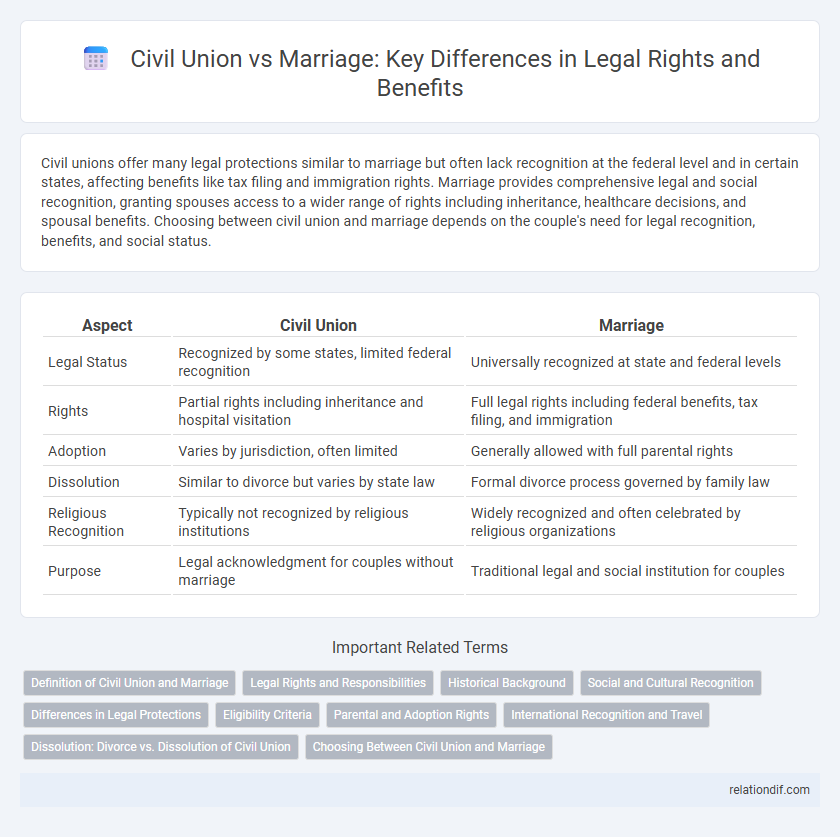Civil unions offer many legal protections similar to marriage but often lack recognition at the federal level and in certain states, affecting benefits like tax filing and immigration rights. Marriage provides comprehensive legal and social recognition, granting spouses access to a wider range of rights including inheritance, healthcare decisions, and spousal benefits. Choosing between civil union and marriage depends on the couple's need for legal recognition, benefits, and social status.
Table of Comparison
| Aspect | Civil Union | Marriage |
|---|---|---|
| Legal Status | Recognized by some states, limited federal recognition | Universally recognized at state and federal levels |
| Rights | Partial rights including inheritance and hospital visitation | Full legal rights including federal benefits, tax filing, and immigration |
| Adoption | Varies by jurisdiction, often limited | Generally allowed with full parental rights |
| Dissolution | Similar to divorce but varies by state law | Formal divorce process governed by family law |
| Religious Recognition | Typically not recognized by religious institutions | Widely recognized and often celebrated by religious organizations |
| Purpose | Legal acknowledgment for couples without marriage | Traditional legal and social institution for couples |
Definition of Civil Union and Marriage
Civil union is a legally recognized partnership similar to marriage, primarily designed to grant couples rights and responsibilities without the religious or cultural connotations traditionally associated with marriage. Marriage is a legally and socially sanctioned union between individuals, often defined by statutory laws and including broader societal and familial recognition. Both civil unions and marriages establish legal benefits such as inheritance, tax benefits, and healthcare decisions, but marriage typically carries a wider range of legal protections and cultural significance.
Legal Rights and Responsibilities
Civil unions provide many but not all legal rights and responsibilities granted by marriage, often including hospital visitation, inheritance, and tax benefits, but may lack federal recognition in some jurisdictions. Marriage typically ensures comprehensive legal protections, including spousal benefits related to Social Security, immigration, and joint tax filing that civil unions might not cover. Couples should evaluate state and federal laws to understand the full scope of legal rights and obligations conferred by each status.
Historical Background
Civil unions emerged primarily in the late 20th century as legally recognized partnerships granting some or all marital rights without the traditional institution of marriage, largely to provide legal recognition for same-sex couples before marriage equality was widely achieved. Marriage, with origins dating back thousands of years in various cultures, traditionally served as a social, economic, and religious contract between individuals and families. The evolution from civil unions to marriage equality reflects ongoing social and legal efforts to extend full marital rights irrespective of gender or sexual orientation.
Social and Cultural Recognition
Civil unions often provide legal recognition similar to marriage but lack the same level of social and cultural acceptance in many communities. Marriage is deeply rooted in religious, historical, and cultural traditions, granting couples broader societal validation and inclusion. Social ceremonies, family expectations, and communal rituals typically favor marriage, enhancing its cultural significance beyond legal status.
Differences in Legal Protections
Civil unions and marriages differ significantly in legal protections, affecting rights such as inheritance, tax benefits, and spousal support. Marriage typically grants comprehensive federal and state recognition, ensuring access to Social Security benefits, immigration rights, and joint tax filing, while civil unions often offer limited state-specific protections without federal acknowledgment. These disparities can impact healthcare decision-making, next-of-kin status, and legal recourse in cases of separation or death.
Eligibility Criteria
Eligibility criteria for civil unions typically include age restrictions, legal capacity, and sometimes residency requirements, differing from marriage laws across jurisdictions. Civil unions often allow same-sex couples to register legally where marriage is not available, while marriage eligibility may demand compliance with traditional legal and religious prerequisites. Some regions require premarital counseling or health screenings for marriage but not for civil unions, reflecting varying legal complexities.
Parental and Adoption Rights
Civil unions often grant some parental rights but typically lack full adoption rights compared to marriage, which provides comprehensive legal recognition of parental responsibilities. Marriage ensures equal parental and adoption rights for couples, including joint adoption and recognition of non-biological parents. Courts frequently prioritize marriage for establishing parental authority and facilitating adoption processes.
International Recognition and Travel
Civil unions often lack consistent international recognition, limiting legal rights and protections abroad, whereas marriage is widely acknowledged across countries, ensuring smoother travel and spousal benefits. Married couples typically enjoy visa privileges, simplified immigration processes, and access to healthcare and inheritance rights worldwide, unlike those in civil unions. International treaties and agreements predominantly recognize marriage, making it the preferred legal status for couples intending to travel or reside abroad.
Dissolution: Divorce vs. Dissolution of Civil Union
Dissolution of marriage requires formal divorce proceedings governed by family law, often involving complex division of assets, alimony, and child custody arrangements. Civil union dissolution typically follows a simplified legal process with fewer requirements and less court involvement, as civil unions have limited federal recognition compared to marriage. Understanding the legal distinctions affects rights, obligations, and financial outcomes during the termination of these partnerships.
Choosing Between Civil Union and Marriage
Choosing between civil union and marriage depends on legal recognition, rights, and personal values, as marriage typically offers broader federal benefits and social recognition. Civil unions provide many state-level rights similar to marriage but may lack nationwide acknowledgment, affecting issues like tax filing, inheritance, and healthcare decisions. Couples should evaluate their priorities regarding legal protections, financial implications, and cultural significance before deciding on either option.
Civil Union vs Marriage Infographic

 relationdif.com
relationdif.com